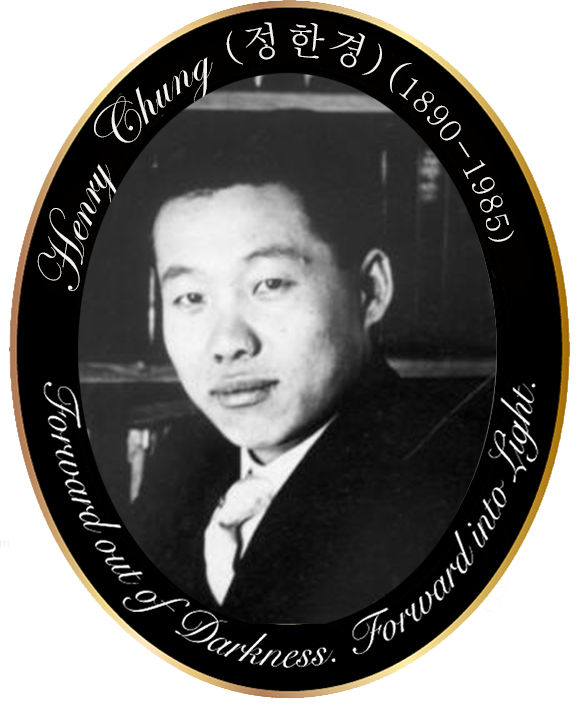정한경(1890-1985)
Whatever may happen in the political arena of the Far East, the Korean people, though disarmed and defenseless, will continue the struggle for life and liberty with undaunted courage and unswerving optimism which forms a peculiar trait of their national character; they will continue.
To hope, till hope creates from its own wreck the thing it contemplates.”
Henry Chung (1890~1985, Korean: 정한경) was a Korean independence activist and a political scholar in the United States. Born in Suncheon, Pyeongan Province, he moved to the United States in 1904 and continued his studies. In 1918, in his Master's Thesis at the University of Nebraska titled "The Oriental Policy of the United States," he analyzed the U.S. foreign policy towards East Asia to criticize the U.S. acquiescence to Japanese colonialism. In 1921, his American University doctoral thesis "The Case of Korea" analyzed 5,000 pamphlets and 10,000 publications related to the March 1st Movement (삼일운동) and introduced them to the English-speaking world. In his thesis, he described Japan's domination of Korea as "the Prussianization of Korea", portraying Japan as "The Germany of Asia", a notion borrowed from Tyler Dennet who compared Korea's colonization of Japan with the German invasion during World War I.
Henry Chung tried to inform the Japanese colonial era of Korea and suggested a new peaceful order in East Asia. After hearing the news of the March 1st Movement in 1919, he sent the U.S. State Department a letter requesting “good offices” following the United States–Korea Treaty of 1882 to stop Japan's harsh repression of the March 1st Movement participants. This appeal echoed Homer Hulbert's earlier attempt in 1905. From April 14th to 16th, he held the First Korean Congress in Philadelphia with Philip Jaisohn (서재필) and Syngman Rhee to lead the Korean independence movement in the U.S. and proposed revisions to the English translation of the Declaration of Independence of Korea. For peace, Chung and Rhee presented a solution that made Korea a buffer state to prevent the Japanese invasion of China and other countries. After that, Chung traveled to many areas in the United States to inform Koreans and Americans of the situation in Korea through speeches and press conferences. Chung also served as a member of the Korean Commission to America and Europe of the Provisional Government of the Republic of Korea. In 1962, the government of the Republic of Korea recognized his contribution and awarded him the Order of Merit for National Foundation Grade 3: Independence Medal.
Henry Chung's presented a speech at the annual banquet of the Cosmopolitan Club at the University of Nebraska in 1916. Titled "The Cosmopolitan", this inspiring speech can be read at our Documents of Virtue (Path 2). He was 26 years old at the time. Chung's notion of Cosmopolitanism and Universal Brotherhood motivated him to share the story of Korea with Americans. Chung eventually became an American Citizen, "Henry Chung De Young" in 1968. He was 78 years old at the time, and Park Chung Hee was the President of Korea.
Numerous photographs and papers of Henry Chung can be seen at the digital archives of the University of Southern California. We recommend spending at least an hour looking at some of the photos and papers from this important Cosmopolitan's life.




